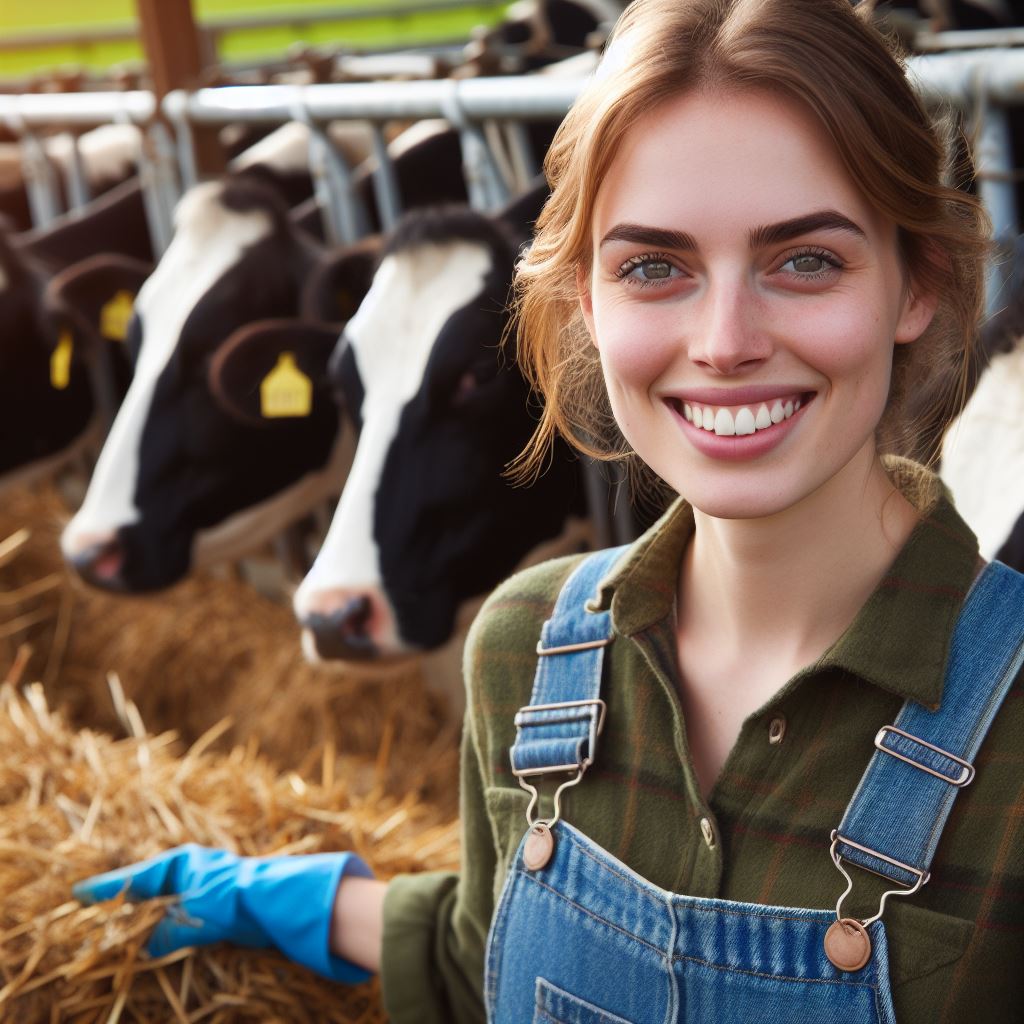Introduction
Organic farming is a method of agricultural production that focuses on sustainability, biodiversity, and environmental stewardship.
In the UK, organic farming has gained significant importance due to its numerous benefits. This section provides a brief overview of the methods and benefits associated with organic farming.
Definition of Organic Farming
Organic farming refers to the practice of cultivating crops and raising livestock without the use of synthetic fertilizers, pesticides, genetically modified organisms (GMOs), or growth hormones.
It relies on natural processes and emphasizes the use of organic materials and techniques.
Importance of Organic Farming in the UK
Organic farming plays a crucial role in the UK’s agricultural sector by promoting sustainability and protecting the environment.
It helps maintain soil fertility, reduces pollution, protects ecosystems, and supports biodiversity. Organic farming also contributes to consumers’ access to safe, nutritious, and chemical-free food.
Brief Overview of the Methods and Benefits of Organic Farming
Organic farming employs various methods such as crop rotation, composting, and biological pest control to ensure the health and productivity of the land.
These methods not only minimize the reliance on external inputs but also promote soil fertility and long-term sustainability.
Moreover, organic farming offers numerous benefits. It helps in reducing greenhouse gas emissions, conserving water resources, and preserving biodiversity.
Additionally, organic produce often contains higher levels of essential nutrients and is free from harmful pesticide residues, making it an ideal choice for health-conscious consumers.
In essence, organic farming in the UK is a sustainable and environmentally friendly approach to agriculture.
Its methods and benefits underline its significance in ensuring food security, protecting natural resources, and promoting healthier lifestyles.
Read: UK Aquaculture Technician: Career FAQs
Methods of Organic Farming in the UK
In organic farming in the UK, various methods are employed to ensure sustainable and ecologically-friendly agricultural practices.
Crop rotation
Crop rotation is a fundamental practice in organic farming. Different crops are planted in a specific sequence to preserve the fertility of the soil and reduce the likelihood of disease and pest infestations.
Composting
Composting involves the decomposition of organic materials to create nutrient-rich compost. This natural fertilizer is used to enhance soil fertility and provide essential nutrients to plants.
Biological pest control
Instead of relying on harmful pesticides, organic farmers employ biological alternatives.
Beneficial insects, like ladybugs and lacewings, and other natural predators are introduced to control pests and maintain a healthy ecosystem.
Use of organic fertilizers
Organic farming in the UK avoids using synthetic fertilizers and instead utilizes natural fertilizers such as manure, bone meal, and seaweed extracts to improve soil fertility.
Restricted use of pesticides and chemicals
In line with organic farming principles, the use of synthetic pesticides and chemicals is heavily restricted. Natural alternatives are preferred to minimize the impact on the environment and human health.
Conservation of soil health
Organic farmers prioritize the preservation and improvement of soil health. They employ techniques such as cover cropping, mulching, and minimal tillage to prevent soil degradation and maintain its nutrient content.
Prevention of soil erosion
To mitigate soil erosion, organic farmers adopt practices like contour plowing, terracing, and establishing windbreaks to protect their fields from wind and water erosion.
Personalized UK Career Consulting
Receive tailored career guidance designed just for you. Get actionable steps and expert support to boost your career in 1-3 days. Take control of your career now.
Get StartedMaintenance of biodiversity on farms
Organic farming supports the preservation of biodiversity by providing habitats for various plant and animal species. Natural vegetation, hedgerows, and wildflower strips are often incorporated into farming landscapes.
Animal welfare practices
In organic farming, high standards of animal welfare are followed. Animals are given access to outdoor spaces, have sufficient room to exercise and behave naturally, and are fed with organic feed.
These methods are integral to organic farming practices in the UK, ensuring sustainable and environmentally-friendly agricultural production.
Read: Forestry Management: UK Best Practices
Benefits of Organic Farming in the UK
Organic farming has gained popularity in recent years due to its numerous benefits in the UK. These benefits can be categorized into environmental, health, economic, and social advantages.
Environmental Benefits
- Reduced chemical pollution: Organic farming avoids the use of synthetic pesticides and fertilizers, minimizing the contamination of soil and water.
- Preservation of natural resources: Organic farming methods promote soil health, water conservation, and biodiversity conservation.
- Reduced greenhouse gas emissions: Organic farming contributes to mitigating climate change by avoiding the use of synthetic fertilizers, which are energy-intensive in production.
Health Benefits
- Higher nutrient content in organic produce: Organic fruits, vegetables, and grains are often found to have higher levels of vitamins, minerals, and antioxidants.
- Absence of harmful chemicals: Organic farming prohibits the use of synthetic pesticides and genetically modified organisms (GMOs), reducing exposure to potentially harmful substances.
- Reduced risk of antibiotic resistance: Organic livestock production prohibits the routine use of antibiotics, decreasing the risk of antibiotic-resistant bacteria in food products.
Economic Benefits
- Potential for higher profitability: Organic products often command higher prices in the market, providing an opportunity for farmers to increase their revenues.
- Increased consumer demand for organic products: The growing awareness of health and environmental concerns has led to a rise in consumer demand for organic food and beverages.
Social Benefits
- Support for local farmers and communities: Organic farming encourages direct relationships between farmers and consumers, creating local economic opportunities and strengthening community ties.
- Promotion of sustainable agricultural practices: Organic farming emphasizes the use of renewable resources, biodiversity preservation, and ecological balance, ensuring the long-term sustainability of agriculture.
In a nutshell, organic farming in the UK offers a wide range of benefits.
It not only protects the environment and promotes healthier produce but also presents economic opportunities for farmers and supports local communities.
By choosing organic products, consumers contribute to sustainable agriculture practices and a healthier future for both people and the planet.
Read: Aquatic Health Management by UK Experts

Find Out More: Brexit and UK Fishermen: Challenges and Opportunities
Delve into the Subject: Foresters and Wildlife Conservation
Challenges and Limitations of Organic Farming in the UK
Organic farming in the UK faces several challenges and limitations, which can pose hurdles to its widespread adoption and growth.
Higher Production Costs
- Organic farming methods typically require more labor and time, leading to higher production costs.
- The expense of organic fertilizers and pest control measures also contributes to increased production costs.
Limited Availability and Diversity of Organic Products
- The range of organic products available in the market is often limited compared to conventional alternatives.
- Due to lower yields in organic farming, certain organic crops may be less available or more expensive.
Reliance on Weather Conditions
- Organic farming heavily relies on favorable weather conditions, which can be unpredictable and prone to variations.
- Extreme weather events such as droughts or excessive rainfall can significantly impact the success of organic farming.
Certification and Regulatory Requirements
- Organic farmers must adhere to strict certification and regulatory requirements to label their products as organic.
- The certification process involves assessments, inspections, and paperwork, adding complexity and cost to the farming operation.
Balancing Organic Production with Market Demand
- Matching the supply of organic products with the market demand can be challenging for organic farmers.
- Changes in consumer preferences and fluctuations in demand for organic products can affect profitability and business planning.
Despite these challenges, the benefits of organic farming make it an attractive option for many farmers in the UK.
By embracing sustainable practices, organic farmers contribute to environmental protection, soil health, and biodiversity.
Consumers are increasingly recognizing the value of organic products, leading to a growing demand for organically produced food.
Furthermore, organic farming can enhance the long-term viability and resilience of agricultural systems.
Your Dream Job Starts with a Perfect CV
Get a tailored CV and cover letter that captures your unique strengths and stands out in your industry. Let us help you make an unforgettable first impression.
Get StartedWith continued research and support, the limitations of organic farming can be effectively addressed, allowing for its wider adoption and success in the UK.
Read: Forestry Policy Changes in the UK
Discover More: Foresters’ Tools and Equipment Guide
Conclusion
Organic farming methods have proven to be effective in the UK, offering numerous benefits.
By avoiding the use of synthetic chemicals and nurturing healthy ecosystems, organic farming promotes biodiversity, protects soil quality, and reduces pollution.
Additionally, organic farming practices prioritize animal welfare and contribute to the production of high-quality, nutritious food.
It is essential for consumers to recognize the significance of supporting organic farming practices to ensure a sustainable future.
To support organic farming, individuals should actively choose organic products. By doing so, they can help reduce their environmental impact and support local farmers who adhere to organic farming standards.
Furthermore, consumers should educate themselves about the benefits of organic farming and spread awareness to others, encouraging them to make sustainable choices as well.
By supporting organic farming, individuals can actively contribute to the well-being of the environment, protect their health, and support local economies.
Let us choose organic products and join the movement towards a sustainable future for the UK.
[E-Book for Sale]
500 Cutting-Edge Tech Startup Ideas for 2024 & 2025: Innovate, Create, Dominate
$19.99 • 500 Tech Startup Ideas • 62 pages
You will get inspired with 500 innovative tech startup ideas for 2024 and 2025, complete with concise descriptions to help you kickstart your entrepreneurial journey in AI, Blockchain, IoT, Fintech, and AR/VR.




